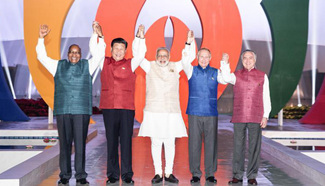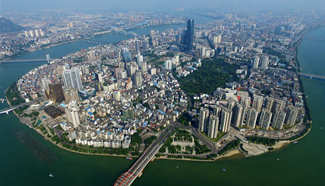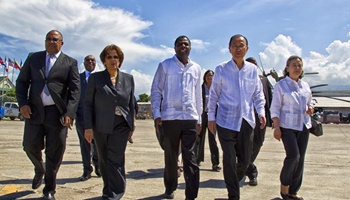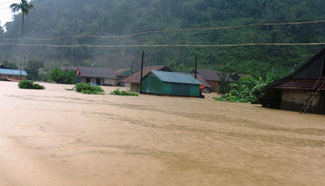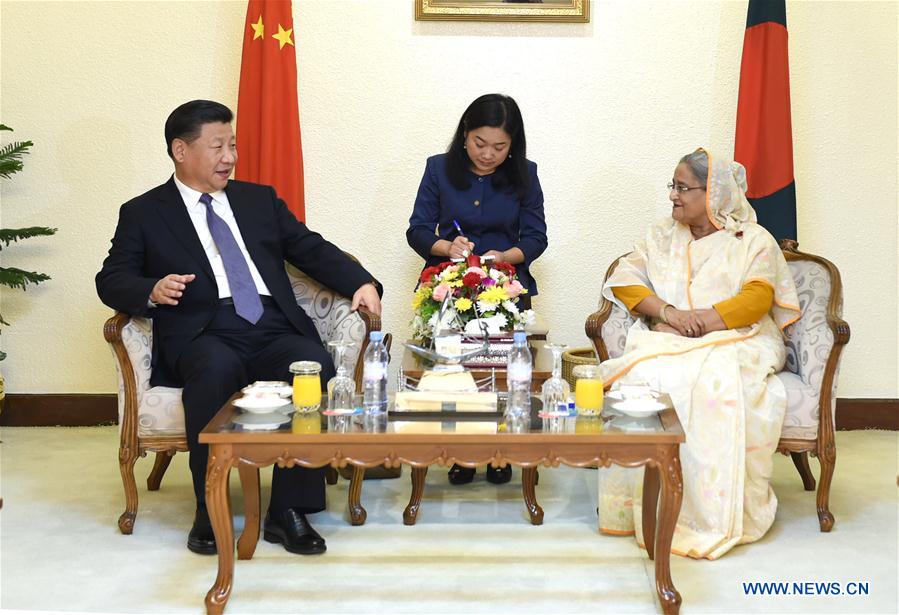
Chinese President Xi Jinping (L) holds talks with Bangladeshi Prime Minister Sheikh Hasina in Dhaka, Bangladesh, Oct. 14, 2016. (Xinhua/Xie Huanchi)
DHAKA, Oct. 15 (Xinhua) -- Chinese President Xi Jinping on Saturday completed a two-day state visit to Bangladesh, during which the two countries agreed to upgrade their ties to a strategic partnership of cooperation.
The visit, the first by a Chinese head of state to the South Asian country in three decades, heralds a new era for cooperation between the two countries, which established contact through ancient silk routes more than 2,000 years ago.
A MILESTONE VISIT
President Xi's "historic visit", called by local newspapers, started with the highest tribute to a foreign president from the Bangladeshi side. Xi was received on Friday at the airport by his Bangladeshi counterpart, Abdul Hamid, and given a 21-gun salute. The host country dispatched fighter jets to escort Xi's plane after it entered Bangladesh's airspace.
In Dhaka, posters with pictures of President Xi and his Bangladeshi counterpart Abdul Hamid, and Prime Minister Sheikh Hasina, are adorning all the major streets and junctions across the city.
During Xi's visit, the two countries agreed to upgrade bilateral ties to a strategic partnership of cooperation, raising the bilateral relationship to a new level.
During his meeting with Hasina on Friday, Xi said the closer comprehensive partnership of cooperation the two sides forged in 2010 has yielded fruitful results, with bilateral cooperation advancing steadily in political, economic, cultural and security areas and on international and regional affairs.
After their talks, the two leaders witnessed the signing of a string of cooperation documents covering such areas as the joint building of the Belt and Road Initiative, production capacity cooperation, information and telecommunication, energy and power, diplomatic affairs, maritime affairs, disaster prevention and alleviation, and climate change.
They also pledged to map out new major cooperation projects, especially in such key areas as infrastructure construction, transportation, information and telecommunication and agriculture.
"Given the high-level political mutual trust and advanced cooperation in many areas between China and Bangladesh, the upgrade (of bilateral ties) was perfectly timed and proper, charting the course for future development of bilateral ties," former Chinese ambassador to Bangladesh Chai Xi said.
ENHANCING SOUTH-SOUTH COOPERATION
Xi's visit to Bangladesh, one of the least developed countries listed by the United Nations, is also aimed at promoting South-South cooperation and inclusive development under the consensus reached at the G20 Hangzhou summit.
During the meeting with his Bangladeshi counterpart, Abdul Hamid, Xi said the two sides agreed to make unremitting efforts to implement the 2030 Agenda for Sustainable Development and push forward South-South cooperation.
The two sides have already shown similarity in their development goals and great potential for further cooperation.
During his talks with Hasina on Friday, Xi said China stands ready to push forward bilateral practical cooperation by aligning the development strategies of the two countries, noting that China is striving for its "two centenary goals" while Bangladesh is pursuing its "Sonar Bangla" dream of national strength and prosperity.
The "two centenary goals" refer to China's aspiration to finish building a moderately prosperous society in all respects by the time the Communist Party of China celebrates its centenary in 2021 and turn the People's Republic of China into a modern socialist country that is prosperous, strong, democratic, culturally advanced, and harmonious by the time it celebrates its centenary in 2049.
Bangladesh, with its "Sonar Bangla" dream, aims to become a middle-income country by 2021 and a developed one by 2041.
China is now the largest trading partner of Bangladesh, and Bangladesh is China's third-largest trading partner and third-largest project contract market in South Asia with bilateral trade reaching 14.7 billion U.S. dollars in 2015.
China-made products, ranging from daily necessities to large machinery, can be found all over Bangladesh.
Industries such as communications and automobiles, in which China has technology and Bangladesh has great demand, hold vast potential for cooperation, said Jiang Jingkui, director of the Center for South Asian Studies at Peking University.
With China's support, Bangladesh implemented in June the country's largest-ever information and communication technology (ICT) project to connect nearly 20,000 government offices across the country.
The project, undertaken by companies including Huawei and China Machinery Engineering Corporation, has been considered a main project for building a digital Bangladesh by 2021.
"Xi's visit signals the beginning of a new era and a new height for China-Bangladesh relations. There will be more and more fruitful cooperation in the development of highways, railways, energy, power and communication," Chai said.
BELT AND ROAD OPPORTUNITIES
"Bangladesh, with its favorable geographic location and huge population, market potential and cooperation space, is an indispensable partner for China to advance the Belt and Road Initiative and production capacity cooperation in South Asia and the Indian Ocean region," Xi said in a signed article carried by leading Bangladeshi newspapers on Friday.
The Belt and Road Initiative, proposed by Xi in 2013, comprises the Silk Road Economic Belt and the 21st Century Maritime Silk Road. It is aimed at building a trade and infrastructure network connecting Asia with Europe and Africa along the ancient trade routes.
Bangladesh's firm support for the Belt and Road Initiative and and the building of an economic corridor linking Bangladesh, China, India and Myanmar (BCIM) have borne fruit.
The multipurpose road-rail Padma Bridge, being built by the China Major Bridge Engineering Company, is the largest and most challenging infrastructure project in Bangladesh's history.
Once opened in 2018, it will significantly improve transportation in Bangladesh's northeast and southwest regions and bolster the Bangladeshi economy by 1.5 percent according to the estimation of economists.
The bridge will also make it more convenient for neighboring countries to use Bangladesh's seaports, and promote the country's trade with China, India and Myanmar.
Chinese enterprises have also signed deals with Bangladesh to build a two-lane tunnel underneath the Karnaphuli River, the first of its kind in Bangladesh, and to carry out detailed engineering design for a four-lane expansion of a national highway.
"Infrastructure is crucial to Bangladesh's development. The Belt and Road Initiative and the BCIM Economic Corridor will help improve air, rail and road transport for countries involved," Jiang Jingkui with Peking University said.
Better infrastructure calls for greater investment. The Asian Infrastructure Investment Bank (AIIB), of which Bangladesh is a founding member, and the Silk Road Fund, among others, could serve as financial sources.
In June, the AIIB approved its first four loans, including one worth 165 million U.S. dollars for a power distribution system upgrade and expansion project in Bangladesh.
"The Silk Road Fund, the Asian Infrastructure Investment Bank and the New Development Bank will help Bangladesh achieve its development goals. We expect closer China-Bangladesh cooperation under the Belt and Road framework," said Xiang Junyong, research fellow with Chongyang Institute for Financial Studies at Renmin University of China.






